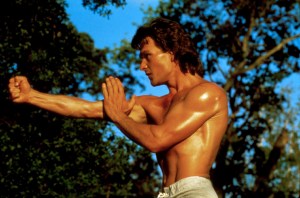The copyright battle over Road House and this year’s remake starring Jake Gyllenhaal and Conor McGregor has turned into a full-on bare-knuckle legal brawl.
If R. Lance Hill, who penned the original 1986 script under the moniker David Lee Henry, thought in his February filing that he was going to bop Amazon Studios, MGM Studios and United Artists over “blatant copyright infringement” – he just got smacked back, hard.
“Plaintiff’s Complaint ignores the well-established rule of copyright law that the author of a work made for hire is not the individual who created the work,” declares the counterclaim filing by Amazon Studios, MGM and United Artists in federal court on May 3 (read it here).
Patrick Swayze in 1989’s ‘Road House’
United Artists/courtesy Everett Collection
The original Patrick Swayze-starring barroom flick came out in 1989 and proved a big hit for the Dirty Dancing star and UA. Flash to 2024, and, amidst accusations of AI use and potential strike-busting, the House that Bezos Built brought out the Doug Liman-helmed Road House redo March 21.
With a pumped-up Gyllenhaal and UFC star Conor McGregor going head to head, the new Road House proved a hit with a record 50 million-plus viewers watching it on Prime Video during its first two weekends, according to Amazon.
It is one of a number of reasons why Amazon and gang are fighting Hill now.
“In 1986, Hill personally acknowledged, represented, warranted — and indeed, contractually guaranteed — that the 1986 screenplay entitled Roadhouse was created as a work made for hire for his own company, Lady Amos Literary Works, Ltd. (“Lady Amos”), and that Lady Amos — not Hill — was therefore its author within the meaning of the U.S. Copyright Act,” the Sheppard Mullin Richter & Hampton LLC-represented defendants/plaintiffs said in their version of events. “For that same reason, Lady Amos, not Hill, was the grantor of the rights that UA purchased in 1986.”
“Hill cannot rewrite this history now, nearly four decades after the fact. His attempt to terminate that grant is invalid and his copyright infringement claim is doomed to fail.”
Claiming a sucker punch, the studios say Hill and his attorney Marc Toberoff’s “claims are barred because Plaintiff’s copyright registration to the 1986 Screenplay was secured through fraudulent statements to the Copyright Office concerning Plaintiff’s purported authorship and ownership and, therefore, is invalid.”
In short, Amazon, MGM and UA say Hill knowingly lied to the government.
That’s BS, responds copyright brawler Toberoff.
“Defendants’ claim of fraud on the Copyright Office is baseless deflection,” the lawyer who took on Warner Bros over Superman and Marvel over Jack Kirby told Deadline on Monday. “Plaintiff informed the Copyright Office that this matter is in dispute and would be the subject of litigation.”
Dispute may be a very Marquess of Queensberry rules way of putting it – at least from what Amazon, MGM and UA’s attorneys are throwing down.
“The contradictions and falsities set forth in the Complaint are nothing but a fiction drummed up by Hill’s counsel, Marc Toberoff, to enrich them both by fabricating a fraudulent claim of copyright authorship,” the counterclaim alleges.
“Upon information and belief, Toberoff (or a company owned and controlled by him) has acquired an interest in the rights to the 1986 Screenplay or an equivalent guarantee from his client in the expectation of an undeserved windfall settlement — a scheme Toberoff has employed to extract self-serving producer deals and other entitlements in numerous works for which he has served notices of copyright termination, ostensibly on his clients’ behalf.”
To that, the counterclaimants want a court judgement that Hill has no copyright hold on the original Road House script. They also want the Copyright Office to shred his January 24, 2024 registration of the 1986 screenplay. Adding insult to injury, the studios are additionally seeking lawyers’ fees and compensatory damages from Hill and his Lady Amos company.
Hold tight, one way or another, someone’s going to get hurt.

